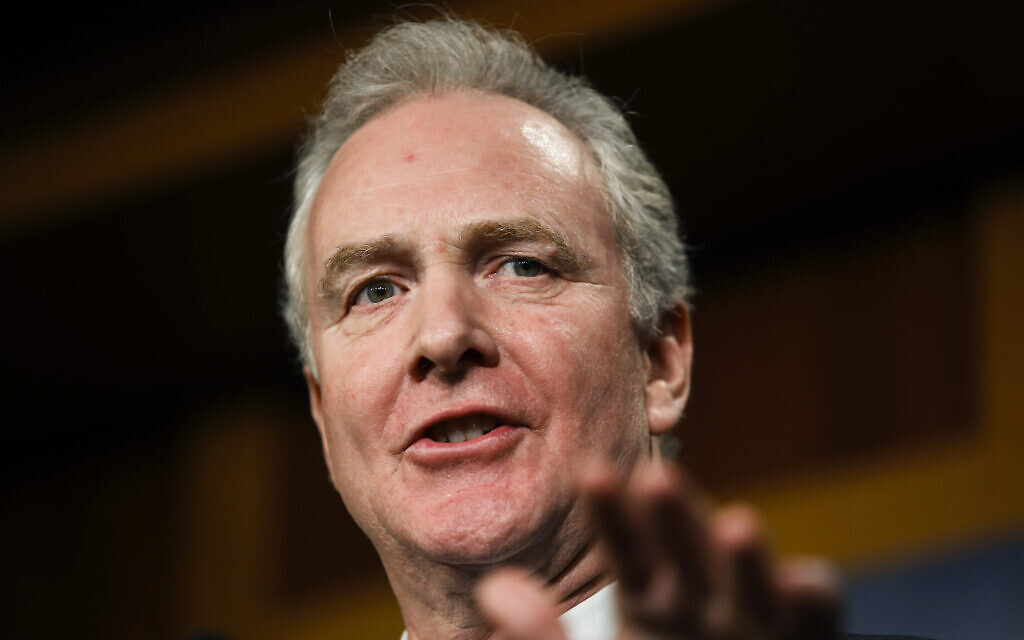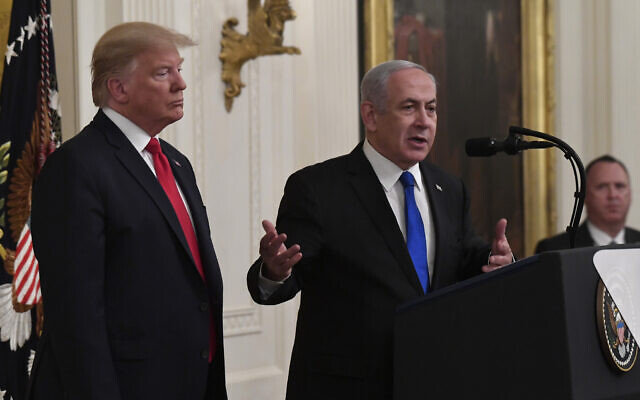With Netanyahu claiming to be on the brink of annexing parts of the West Bank, moderate Democrats are calling for unprecedented changes to America’s funding policy

WASHINGTON — If Prime Minister Benjamin Netanyahu unilaterally annexes parts of the West Bank, he will do so knowing that virtually the entire United States Democratic Party opposes the move.
The leadership has spoken out against it, including Senate Majority Leader Chuck Schumer and House Speaker Nancy Pelosi, and at least 210 of the 233 Democrats in Congress have sent or signed on to letters urging Jerusalem to drop the proposal.
But now, some Democrats are no longer just stating their disapproval of annexation; rather, they are calling for a policy response should Netanyahu go through with it.
Last week, Maryland Senator Chris Van Hollen introduced an amendment to the 2021 National Defense Authorization Act (NDAA) to block US funds from going toward the prime minister’s planned annexation of roughly 30 percent of the West Bank.
The motion currently has 13 co-sponsors, including Massachusetts Senator Elizabeth Warren, Vermont Senator Bernie Sanders and Virginia Senator Tim Kaine, and is backed by a coalition of liberal Zionist groups, such as J Street and Americans for Peace Now.

“It’s a mainstream idea now being actively discussed in the United States Senate, in the heart of the Democratic Party, that in light of contemplated Israeli actions, there has to be some set of restrictions in the way American assistance is shaped,” said Jeremy Ben-Ami, founder and president of the liberal Mideast advocacy organization J Street.
The Van Hollen amendment doesn’t go as far as a letter orchestrated by New York Congresswoman Alexandria Ocasio-Cortez and signed by some of the most progressive members of Congress — such as Sanders — that calls for reducing the $3.8 billion in annual aid to Israel if the country moves forward on annexation.
Instead, it would keep US assistance at the same levels, but bar American taxpayer dollars from being used to annex the West Bank.
“People who want to cut aid generally don’t want to see the full check of $3.8 billion actually delivered,” Ben-Ami told The Times of Israel. “People who want to restrict aid are perfectly comfortable with the $3.8 billion, but it just shouldn’t be used for the following purposes.”
Still, the powerful American Israel Public Affairs Committee (AIPAC) has expressed strong opposition to the amendment, tweeting that it would “weaken Israel’s defenses” and limit “where Israel can place lifesaving missile defense systems like Iron Dome.”
At the same time, all sides know that with a Republican majority in the Senate and US President Donald Trump in the White House, the amendment has no chance of being passed and signed into law.

Activists and analysts argue, therefore, that its significance comes more in the form of what it symbolizes than what it might tangibly accomplish in the short term.
“There is now more consensus within the Democratic Party on opposing annexation than on supporting the same level of American aid to Israel,” a veteran Democratic operative close to presidential candidate Joe Biden told The Times of Israel.
In a politically fractured Israel, Netanyahu has pushed for annexing, as early as this summer, all of the settlements and the entire Jordan Valley — the parts of the West Bank allocated to Israel under Trump’s plan, which theoretically envisions a Palestinian state in the remaining territory with land swaps.
For Ben-Ami, whose organization has been leading a campaign against annexation in Washington, the amendment’s support among leading and more moderate Democrats such as Van Hollen marks a fundamental shift in how the party views the nature of American aid to Israel.
“I think the bigger argument is really over the question of whether it’s appropriate to have restrictions [on funding], period,” Ben-Ami said. “One can quibble here or there about a word and change the meaning of the exact drafting, but I think the principle is what Senator Van Hollen and his co-sponsors have established here: US assistance cannot be and should not be a blank check.”
This debate is ‘not going away’
The amendment is not supported by everyone on the left. Michael Koplow, the policy director of the Israel Policy Forum, which advocates a two-state solution, wrote in a column last Thursday that he did not consider it a “wise policy move.”
But Koplow noted that “the sudden prominence of the debate over conditioning assistance to Israel is inextricably linked to annexation and thus is not going away.” He described the Van Hollen proposal as the “only option left to send a message [to Israel] that goes beyond strongly worded objections.”

Halie Soifer, head of the Jewish Democratic Council of America, emphasized that Biden has stated that he wouldn’t touch aid to Israel, calling the idea “outrageous,” and that only 13 of the 45 Senate Democrats have co-sponsored the amendment.
“Yes, there is a discussion going on amongst some, but when it comes to those leading the party — and hopefully soon from the White House — it doesn’t appear that they are part of that conversation, nor do they want to be,” Soifer told The Times of Israel.
But Palestinian-American pollster Shibley Telhami of the Brookings Institution said that Democratic grassroots activists have wanted see changes to America’s Israel policy for years.

In 2014, for instance, he published a survey that found 77% of Democrats wanted the United States to remain neutral on the Israeli-Palestinian conflict.
Since then, he said, a number of factors have made Democratic politicians willing to adopt a more aggressive posture toward Israel — Netanyahu’s acrimonious relationship with former president Barack Obama; Sanders’s strong constituency during the 2016 primary that cared about Palestinian rights; and the Israeli premier’s close alliance with Trump.
The looming possibility of annexation has only intensified and accelerated that political shift, suggested Telhami, the Anwar Sadat professor for peace and development at the University of Maryland.
“Van Hollen and his colleagues are trying to balance their historical support for Israel — and Van Hollen has always been supportive of Israel and securing aid to Israel — and their anger with annexation and policies that go against the ethos of what a Democrat is and what they stand for,” he said.
Telhami conducted a poll in March that found 81% of Democratic respondents favored Israel’s democracy more than its Jewishness. (Forty-four percent of Republicans said the same.)
Most Democrats, however, want Israel to survive as a Jewish democracy, he said, and fear that Netanyahu is taking steps that will make that outcome increasingly unrealistic.
“They don’t want to be put in that position. They support a Jewish state. They support a democratic state,” Telhami said. “Annexation puts them in a position in which they have to make a choice. So they are now taking steps to prevent that from happening.”
As reported by The Times of Israel
